WATCH: Fracking Contamination Will Only Get Worse 5:32 Min. by BNN, January 13, 2013, Bell Media
BNN speaks with Karlis Muehlenbachs, Geochemist & Professor, University of Alberta who says hydraulic fracturing contamination will get worse.
Business News Network: People often talk about the mysterious chemicals involved in hydraulic fracturing, but what about the possibility of frac’d wells leaking natural gas, methane, and other problem substances into the environment? Our guest says, quite a few fractured wells in British Columbia leak from day one. Now here’s an interview he gave at a website called tyee.ca, he says that generally, ah, in Alberta this is also a problem, as soon as the leaks enter groundwater, the industry goes into denial.
He also says, Alberta regulators don’t listen to him. They’re only interested in optimizing production. Well, joining us from Edmonton is Karlis Muehlenbachs. He’s a geochemist, and professor at the University of Alberta.
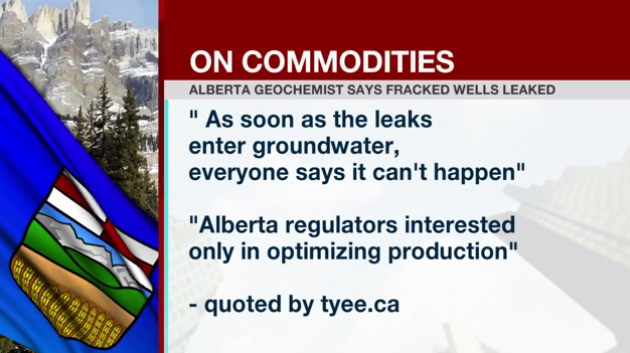 Professor, thank you so much for joining us.
Professor, thank you so much for joining us.
Dr. Muehlenbachs: Ya, It’s my pleasure
Business News Network: And just to clarify. We’re going to be talking today about leaking natural gas, we’re not talking about fracking chemicals right now. Can you tell us, leaking .. natural gas leaking into groundwater. Why is that a problem?
Dr. Muehlenbachs: Well, I think it’s a general pollutant. I mean it’s, ah, it can catch on fire if there’s lots of it. You’ve probably seen the pictures of the burning waters. Ah, it can actually change the chemistry of the groundwater, so you can actually change the taste of the water and so on. And actually, if it accumulatives in a pump house or a bathroom, it can blow up. I mean, it’s a general hazard. Plus, it’s an added burden to the green house budget – in other words, all this methane leaking into the atmosphere, it can affect our climate. It is a serious problem.
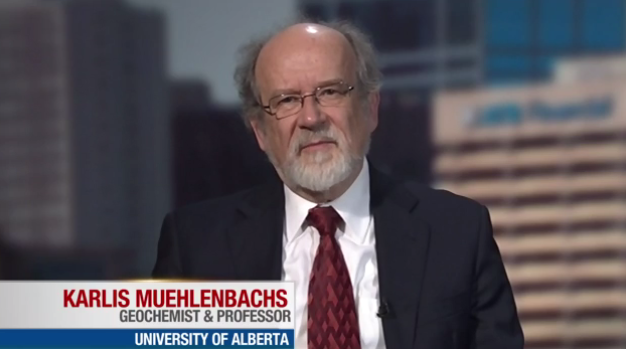 Business News Network: You say that up to 10 % of hyraulic wells are leaking, obviously that’s kind of a ballpark estimate, and that some wells in BC are leaking from day one! Why is the industry letting this happen?
Business News Network: You say that up to 10 % of hyraulic wells are leaking, obviously that’s kind of a ballpark estimate, and that some wells in BC are leaking from day one! Why is the industry letting this happen?
Dr. Muehlenbachs: I think it’s extremely difficult to seal them. When you drill those wells, you’re basically putting a steel pipe in the ground, you put in lots of cement, and you hope it seals it. But then, when you do the fracking operation, you put all these high pressure pulses in there, and it basically expands the metal, and then the metal contracts, and you do it 20 or 30 times and you basically create small cracks in many places. And, it’s very very difficult to …avoid that.
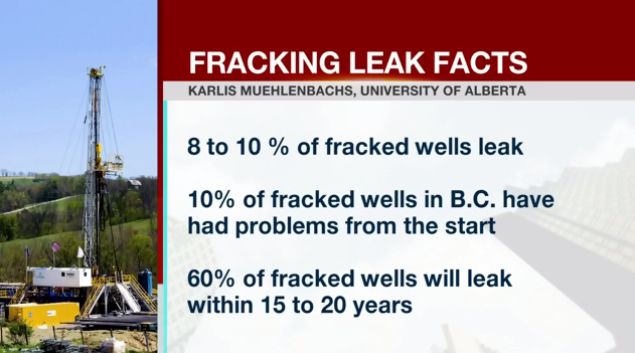 Business News Network: We contacted the Alberta regulator. They said, look, over many years, thousands of wells have been frac’d in Alberta and they say there’s never been a case of natural gas leaking or contaminating ground water.
Business News Network: We contacted the Alberta regulator. They said, look, over many years, thousands of wells have been frac’d in Alberta and they say there’s never been a case of natural gas leaking or contaminating ground water.
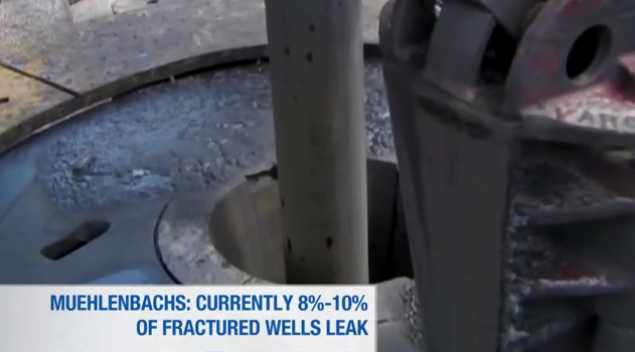 Dr. Muehlenbachs: Ah, well they and I disagree. … When you say fracking, do you mean hydraulic fracking with the water and in great depths? Or are you talking about the coalbed methane in southern Alberta around Rosebud? Ah, but I think there’s been plenty of indicators that…groundwater has been impacted by conventional oil development. The fracing is fairly new, except for the coalbed methane stuff, and I think there’s plenty of evidence that the coalbed methane operations have impacted groundwater.
Dr. Muehlenbachs: Ah, well they and I disagree. … When you say fracking, do you mean hydraulic fracking with the water and in great depths? Or are you talking about the coalbed methane in southern Alberta around Rosebud? Ah, but I think there’s been plenty of indicators that…groundwater has been impacted by conventional oil development. The fracing is fairly new, except for the coalbed methane stuff, and I think there’s plenty of evidence that the coalbed methane operations have impacted groundwater.
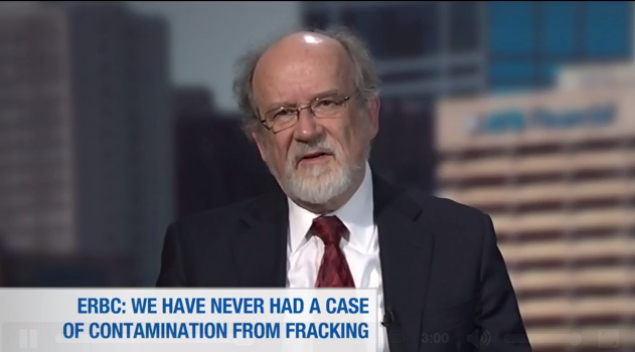 ….just before Christmas, the ERCB released a report that shows that clearly fracing impacted … there was a huge pollution event near Grand Prairie, I think it was. That they just released. The report just released a few weeks ago. Saying there’s never been a problem is just sloganeering, they’re just trying to cover up…the obvious, you know, impacts.
….just before Christmas, the ERCB released a report that shows that clearly fracing impacted … there was a huge pollution event near Grand Prairie, I think it was. That they just released. The report just released a few weeks ago. Saying there’s never been a problem is just sloganeering, they’re just trying to cover up…the obvious, you know, impacts.
Business News Network: And you say then, over the next 20 to 50 years, the majority of wells are likely to leak. Is that just this old pipe in the ground or how does that work?
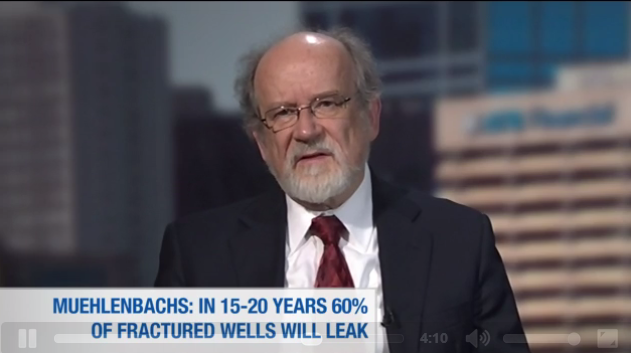 Dr. Muehlenbachs: Ah, well, that statement is based on experience in the US on the Gulf Coast, offshore. The US Federal Inspectors have followed the integrity of the offshore platforms, and they clearly show evidence that as the age, as the wells age, there’s a higher and higher percentage of problems and I think you can just extrapolate, the cements and the steels are more or less the same, so the results are going to be the same. You know, the past is prolougued. You can basically say, ya, the problems are going to get worse. And the fracking actually increases the likelihood of problems.
Dr. Muehlenbachs: Ah, well, that statement is based on experience in the US on the Gulf Coast, offshore. The US Federal Inspectors have followed the integrity of the offshore platforms, and they clearly show evidence that as the age, as the wells age, there’s a higher and higher percentage of problems and I think you can just extrapolate, the cements and the steels are more or less the same, so the results are going to be the same. You know, the past is prolougued. You can basically say, ya, the problems are going to get worse. And the fracking actually increases the likelihood of problems.
Business News Network: We’ve less than a minute, I’m very sorry about that. The industry has a voluntary code of conduct on preventing leaks. You say it should be made compulsory as a start.
Dr. Muehlenbachs: Oh absolutely. I mean, it’s just sloganeering, saying “We’re going to do it”. “We’re going to do it.” It’s just promises. You have to require it, and you have to inspect it. I mean, the reason I brought up the offshore stuff, those are federal government inspectors that actually inspected it, while in Alberta, it’s all self reporting. And in BC, it’s self reporting. Ah, you know, let’s .. you know .. take this seriously and react appropriately.
Interviewer: Professor, Thank you so much.
Dr. Muehlenbachs: Thank you, it’s my pleasure.
…
Business News Network: We did ask Canadian Association of Petroleum Producers How do you think, what do you think of the professor’s comments? They referred us to the [ERCB], the Alberta regulator, and we told you a part of their reaction. [Emphasis added]
[Refer also to:
